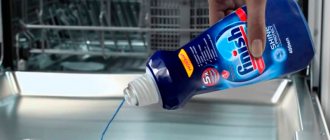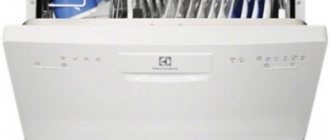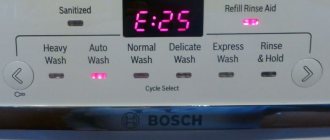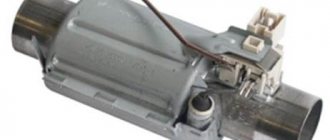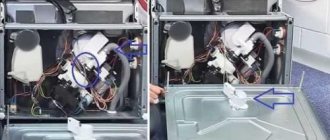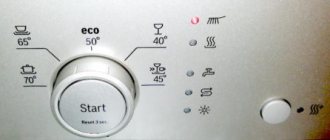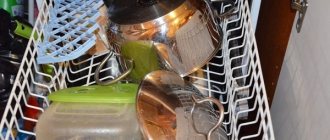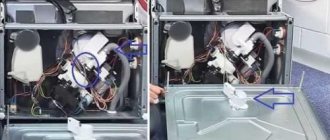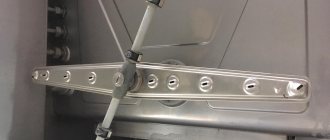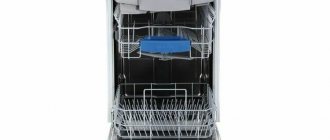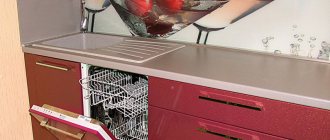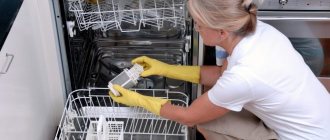Owners of dishwashers (hereinafter also referred to as PMM, dishwashers) sooner or later are faced with the fact that they have to spend substantial sums of money on the purchase of chemicals for the dishwasher. Therefore, many are interested in whether it is possible to make dishwasher tablets with your own hands as a cheaper alternative. The urgency of the problem is added by the fact that the “all-in-one” tablets offered to customers in stores contain substances that are harmful to health.
Dishwasher tablets available in retail stores
The composition of industrial tablets contains: chlorine, formaldehyde, phosphates and even hydrochloric acid. How to replace dishwasher tablets? Below are recipes for making homemade “homemade” tablets that can successfully replace store-bought products. At the same time, their cost is several times less.
Products based on washing powder
The idea is to use laundry detergent for children's clothes and linen as a detergent. This powder is harmless and has hypoallergenic qualities.
Prepare and mix the following ingredients in a certain proportion:
- children's washing powder intended for automatic washing, for example “Ushasty Nyan” - 4 cups;
- soda ash - 1.5 cups;
- any liquid intended for hand washing dishes - 5 tablespoons;
- water – 50 ml (1/4 cup).
Washing powder for all types of laundry “Ushasty Nyan”
the resulting mixture, which looks like a thick paste , into small molds. The main thing is that their size is not too large and the workpieces can subsequently be placed in the bunker. Then wait until the slurry dries to form briquettes. You can effectively wash dishes with homemade “bricks” without fear for your health.
To prepare tablets according to this recipe, you will need soda ash; baking soda will not work.
Even when using all-in-one tablets, it is necessary to add special salt to the hopper, otherwise the tap water will not soften to the desired level. The same applies to the rinse aid - in any case, it is advisable to pour it into the container provided for this purpose.
Read our article about how much salt you need to put in the dishwasher.
Making tablets for PMM on your own
Detergents for the dishwasher can be easily and quickly made on your own. To give the tablet form, you can use ice cube trays. Recipe 1: You need to mix one tablespoon of ingredients such as baking soda, borax and concentrated lemon juice. For hard water, the proportions of soda can be increased to 2 tablespoons. Vinegar should be used when rinsing dishes.
Recipe 2: you need to mix ingredients such as baking soda, borax, and any dishwashing detergent in equal proportions. Here you can also double the amount of baking soda in case of hard water. In addition, vinegar is also required in the rinse aid dispenser.
Briquettes based on soda ash
Experienced housewives often use the following successful combination of several ingredients, resulting in a good composition for washing cutlery:
- soda ash - 3 cups;
- table/Epsom salt (magnesia) – 1.5 cups;
- citric acid – 0.5 cups;
- manual dishwashing liquid - 3 tablespoons;
- water – 1 glass.
Before mixing, the soda ash must be heated in a clean frying pan for 15 minutes, stirring occasionally. Only after this can you add the remaining components. Then the mixture is distributed into molds and waited until it dries.
Citric acid is a popular cleaning agent.
Benefits of Homemade Recipes
The main factor when choosing dishwasher tablets is price. With daily use, PMM tablets are consumed quickly and constitute a significant household expense. Homemade detergent benefits from cheap and readily available ingredients.
The second, no less important aspect is environmental friendliness. The finished tablets may contain various chemicals - from surfactants that bind fat to chlorine compounds that are better at removing dirt but are harmful to the body. Their traces may remain on the dishes even after rinsing. In addition, store-bought briquettes contain phosphates, formaldehydes, and hydrochloric acid.
Therefore, it is preferable to take tablets prepared at home from improvised means. They are easily washed off from the surface of the dishes, do not cause harm to the body, even if they get into food in small quantities, and are not hazardous to the environment when discharged into sewer drains.
Preparing the mixtures does not take much time. You can calculate the volume of components depending on the number of free molds and prepare from 20 to 50 tablets in 15 minutes. They will last a long time even with daily use.
Baking soda tablets
There is another elementary recipe, the ingredients for which can be found in almost any kitchen. Prepare the following ingredients:
- baking soda – 2 cups;
- table salt – 1 glass;
- citric acid – 0.5 cups;
- water – 1 glass.
You can also make “bricks” for dishwashers using baking soda.
One glass of soda is heated, for which it is placed in the oven on a baking sheet at a temperature of +200 ℃. You need to heat for 30 minutes, stirring. Then all the ingredients except water are added to the hot soda. When the dry mixture is ready, add a glass of water to it in parts, avoiding too much foaming. The resulting slurry is distributed into molds in a warm place and allowed to dry.
What to wash dishes with?
A dishwasher saves us from fussing with dishes, but it does not protect us from contact with harmful substances. When washing dishes in a dishwasher (DMM), various “chemicals” are used:
- powders or gels;
- rinse aid;
- universal three-in-one tablets.
Tablets are especially convenient; they contain everything you need - detergent, rinse aid and salt for water softening. It turns out that at home you can make a homemade composition for PMM, which is safe and quite effective.
Composition based on magnesium
Magnesia, or Epsom salt, successfully washes even the dirtiest dishes. Based on it, you can make a mixture by adding several other components in the following proportions:
- Magnesia/Epsom salt/Epsom salt – 2.5 cups;
- soda ash – 1 cup;
- sodium tetraborate (borax) – 1 glass;
- citric acid – 0.5 cups;
- liquid/gel for washing dishes – 4 tbsp. l.;
- water – 1 glass.
Sodium tetraborate can be purchased in such packages
Borax and Epsom salts can be purchased at pharmacies; these components are inexpensive. Dissolve citric acid in water. Mix the remaining dry ingredients thoroughly. Add the acid solution to the dry mixture, avoiding too violent a chemical reaction. Mix all the ingredients well, distribute the resulting slurry into the molds and wait until it dries.
The better all the components are mixed, the better the homemade tablets will wash tableware.
Do homemade dishwasher tablets wash well?
The quality of washing dishes with self-prepared tablets is approximately at the level of a cheap group of store-bought products.
In addition to detergent, expensive PMM tablets contain rinsing layers, fat solvents, anti-scale agents, etc.
All this is not found in homemade tablets, but their simple composition and low cost justify this drawback.
Advantages of homemade briquettes for the dishwasher
Why is it more profitable to prepare universal dishwashing detergents with your own hands? Firstly, they are much cleaner in environmental terms and do not contain substances harmful to humans, unlike the “secret” compositions of tablets produced by industry. Secondly, simple calculations show that one briquette made in the kitchen costs 4-5 times less than a store-bought one .
Dishwashing detergents that can be bought in stores are easy to use, but expensive
It only takes 15-20 minutes to make dishwasher detergent with your own hands; the rest of the time they dry in a warm room. The tablets are then stored in a dry and dark place. They can be used for six months, during which time the briquettes will not lose their basic properties. Once dried, the small “bricks” do not fall apart or crumble.
Regular use of self-made detergent compositions does not negatively affect the operation of the PMM. The surface of the dishes is washed clean, and after rinsing there are no streaks or stains left.
So, making universal briquettes for dishwashers with your own hands is very profitable. Compared to industrial household chemicals, such products have practically no disadvantages, but there are enough advantages.
What is included in dishwasher tablets?
Modern industrial products for PMM have a similar composition of chemical components that contribute to high-quality cleaning of dishes.
Chlorine
The most dangerous element of the tablets is chlorine, used to disinfect water and dishes. It can lead to serious illnesses. In the European Union, the use of some chlorine-containing substances is already prohibited.
Sodium citrate
Sodium citrate, designated E331, is needed to form foam and disinfect kitchen utensils. The substance is part of food additives approved in the Russian Federation.
Sodium percarbonate
Persalt or sodium percarbonate is a derivative of hydrogen peroxide and sodium carbonate. The substance has a bleaching effect, so it can often be found in powders for white laundry. The component makes washing dishes easier by breaking down dirt.
Sodium disilicate or “liquid glass”
Another component that softens water and prevents the deposition of salts on the internal parts of PMM is sodium disilicate or so-called liquid glass. In industry, the substance is used for anti-corrosion and antiseptic treatment. In detergents, sodium disilicate acts as a multifunctional substitute for phosphates.
Sodium gluconate
A well-known food additive, sodium gluconate, has a negative effect on the human body when used in excess. The substance is found in household chemical products and is also used in the metallurgical and oil industries. The main purpose of sodium gluconate is to prevent the formation of limescale.
Soda Ash
To soften hard water, you can find soda ash in the list of ingredients in dishwasher tablets.
Sodium bicarbonate
Baking soda or calcium bicarbonate is a powder used to soften water with high salt content.
Isooctyl glucoside
Washed dishes shine clean thanks to a chemical component such as isooctyl glucoside.
Sorbitol
The thickener sorbitol is used in detergents to give the composition uniformity.
Rapeseed oil methyl ester
The resulting surface tension of water is reduced with the help of a component such as rapeseed oil methyl ester.
Glycerol
Glycerin is used to create cosmetics and smoking liquid for electronic cigarettes. In household chemicals it is used as a thickener. Glycerin makes the product viscous and helps maintain this consistency.
Acetic acid
The scale that forms on the parts of the dishwasher over time is washed off thanks to acetic acid. In addition, the substance gives the dishes shine.
Amylase and protease
These components break down carbohydrate and protein compounds, so that even dried food remains are washed off easily.
Subtilisin
An element that helps get rid of fatty contaminants is subtilisin.
Various surfactants and A-surfactants
Surfactants clean dishes well due to the fact that they connect water and fat molecules.
But at the same time they are able to break down human sebum. Therefore, these substances can cause serious harm to health. Anionic surfactants are considered the most dangerous. The effect of these harmful components can be enhanced by phosphates, since they facilitate the penetration of substances into the human blood through the skin. According to Russian sanitary standards, the concentration of surfactants in household chemicals should not exceed 5%.
Have you set the water hardness in PMM?
Yes, of course. No.
